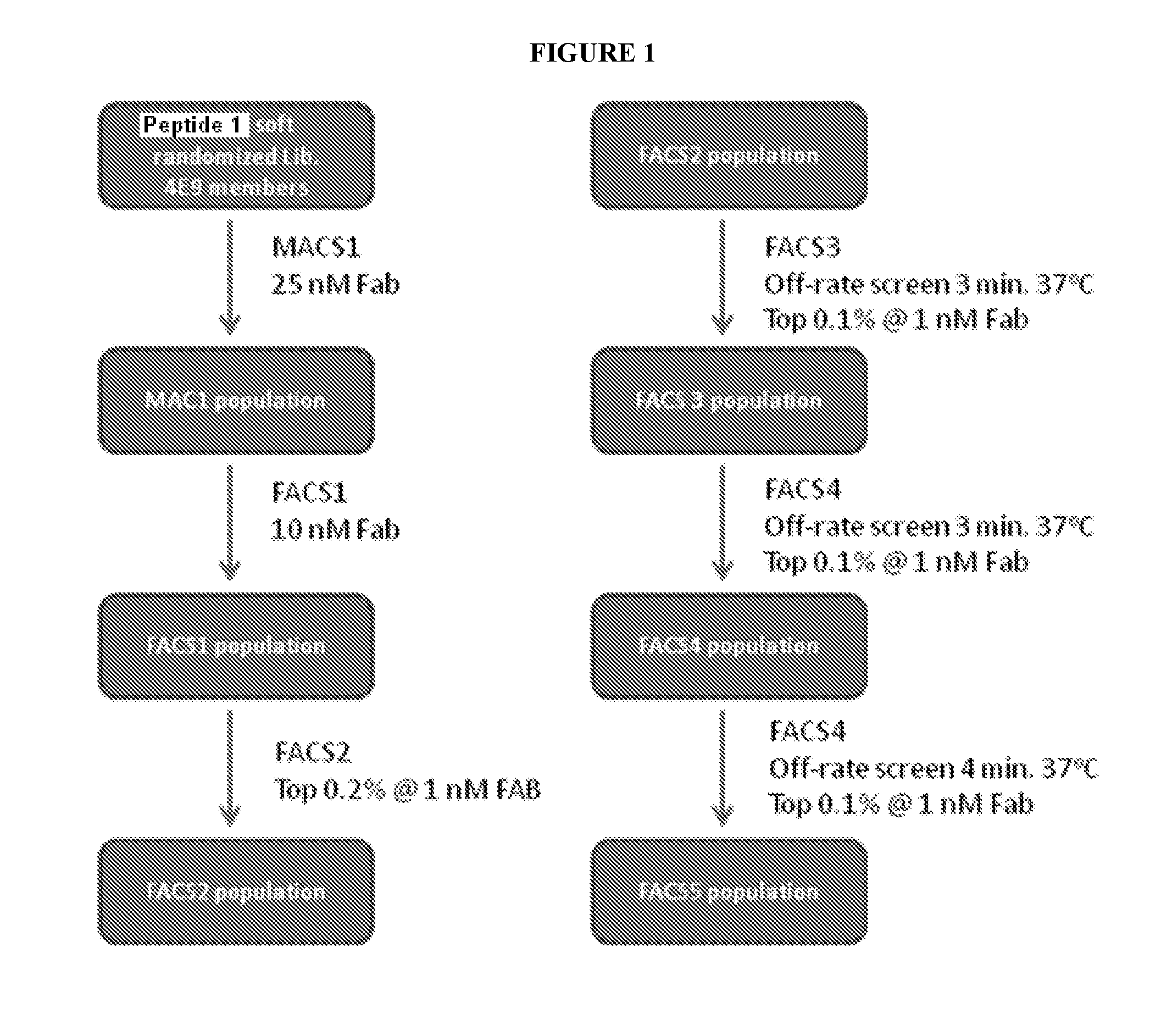Activatable antibodies that bind interleukin-6 receptor and methods of use thereof
a technology of interleukin-6 receptor and activation antibody, which is applied in the field of activation antibodies, can solve the problems of limited therapeutic effectiveness, rapid clearance from the circulation, and other limitations of antibody-based therapeutics, and achieve the effect of reducing the ability of ab to bind
- Summary
- Abstract
- Description
- Claims
- Application Information
AI Technical Summary
Benefits of technology
Problems solved by technology
Method used
Image
Examples
example 1
Materials and Methods for Anti-IL6R Antibody Masking Moiety Discovery
[0429]The studies described herein are used to identify suitable masking moieties for activatable anti-IL6R antibodies using an initial round of magnetic activated cell sorting (MACS) followed by sufficient fluorescent activated cell sorting (FACS) to gain a population that shows reasonable enrichment of one or more peptides that specifically bind the antibody and Fab of interest.
[0430]Magnetic Activated Cell Sorting (MACS).
[0431]A 500 mL LB-CM (chloramphenicol) culture is inoculated with 1E11 cells from a cellular peptide display library in which the displayed peptides include a 15-mer randomized section (approximately 2E10 diversity). When the culture reaches an OD600 of between 0.6 and 0.8, arabinose (the cellular peptide display libraries are expressed from the pBAD promoter) is added to 0.2% and the culture is grown for another 1.5 hrs before being placed on ice for 20 minutes. Sufficient cells to cover the li...
example 2
Affinity Maturation of Anti-IL-6R Binding Peptides
[0456]The two anti-IL6R binding peptides isolated from the naïve library were both affinity matured. The peptide of SEQ ID NO: 33 (Peptide 1) is a cysteine constrained peptide that was the most enriched member in the M1F2 pool, while the peptide of SEQ ID NO: 34 (Peptide 2) is a linear peptide. Although the peptide of SEQ ID NO: 34 was isolated from an X15 library, a mutation in the linker resulted in the peptide being 16 amino acids. The affinity maturation for both peptides followed the standard methods, beginning with the screening of a soft randomized library followed by screening directed libraries.
[0457]Affinity Maturation for Peptide 1
[0458]A softly randomized library of the peptide of SEQ ID NO: 33 (Peptide 1) containing approximately 4E9 members was built and screened as shown in FIG. 1.
[0459]For the initial round of MACS (MACS1, M1) for the soft randomization library based on Peptide 1, 1E11 cells were screened using Strept...
example 3
Evaluation of Efficiency of Masking Moieties
[0483]Masking the ability of an antibody to bind to its antigen is an example of inhibition of binding. The extent of inhibition is dependent on the affinity of the antibody for its antigen, the affinity of the inhibitor for the antibody and the concentration of all reactants. Local concentrations of the tethered peptide mask (inhibitor) is very high in the activatable antibody context, on the order of 10 mM, therefore moderate affinity peptides would effectively mask activatable antibody antigen binding.
[0484]However, since peptide affinity is largely determined by off-rate, displacement of the mask by antigen with a high affinity, would present as a slow on-rate antibody, therefore long term binding measurements are necessary to accurately measure the masking efficiency of a tethered peptide inhibitor. To this end, a time and concentration dependent ELISA assay, run at 37° C., has been developed to measure the equilibrium binding of an a...
PUM
 Login to View More
Login to View More Abstract
Description
Claims
Application Information
 Login to View More
Login to View More - R&D
- Intellectual Property
- Life Sciences
- Materials
- Tech Scout
- Unparalleled Data Quality
- Higher Quality Content
- 60% Fewer Hallucinations
Browse by: Latest US Patents, China's latest patents, Technical Efficacy Thesaurus, Application Domain, Technology Topic, Popular Technical Reports.
© 2025 PatSnap. All rights reserved.Legal|Privacy policy|Modern Slavery Act Transparency Statement|Sitemap|About US| Contact US: help@patsnap.com



